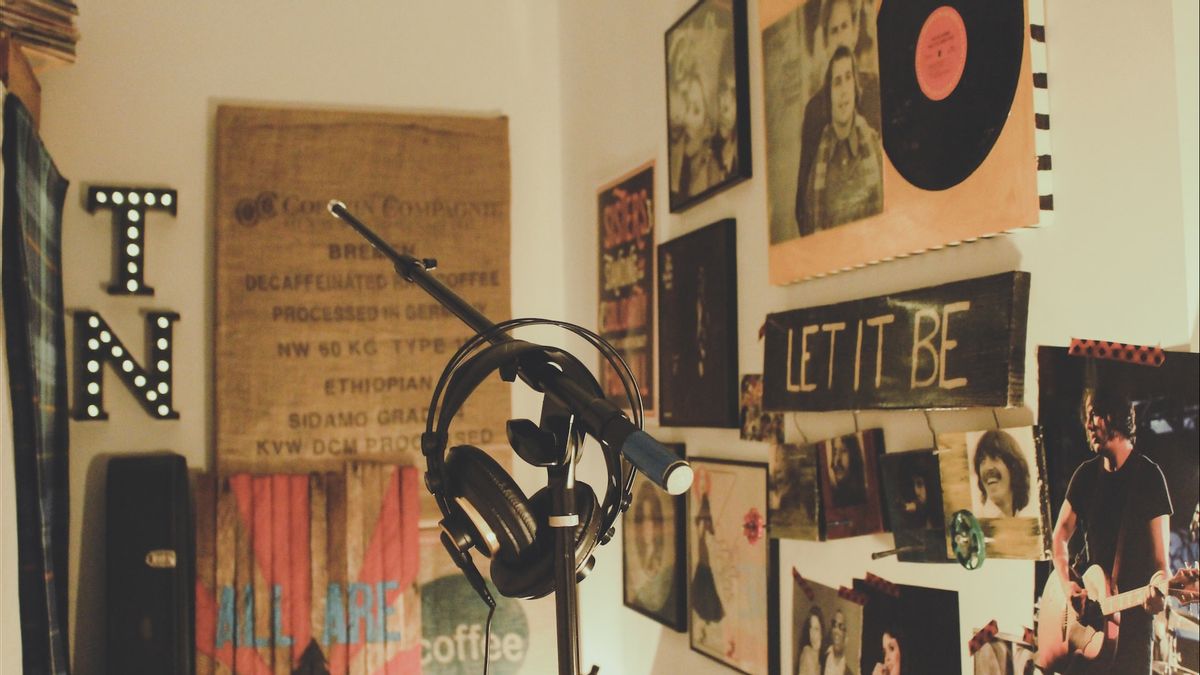JAKARTA - A study conducted at the end of 2020 - during the COVID-19 pandemic shows how music affects humans in terms of body, mind and behavior. Scientists combine the performance of Dr David Lewis of Mindlab International with survey results from 3,000 respondents in the UK, Germany, and Hungary.
The study focused on ten different reactions to music, including increased memory function, feelings of happiness, and the power to slow down or accelerate a person's heart rate. The results show that six out of ten respondents across Europe reported their memory function lower than before. Nonetheless, 72 percent of respondents say that music has helped them get through difficult times.
Based on the research from Dr David Lewis, Sony, created two visual representations of how powerful music can affect us physically and emotionally. The visual describes how high and low tempo music, coupled with omnidirectional sound and lighting features, affects our bodies and objects around us. Claire Poux, head of marketing category, V&S in Sony UK & Ireland, said: "We can all recall moments in our lives where music has played an inseparable role.
"From children's songs as children to our wedding day dance songs; it evokes feelings and memories, getting us on the way. 2020 has been a tough year for all of us, we want to make this report and video to show how powerful music is, inspiring more people to use it as a tool for positivity in their lives."
According to the data, music can also help us sleep at night where the composition of Vivaldi's Four Seasons song is considered the most effective as an introduction. Recently, BTS and Billie Eilish's songs were also recognized by scientists to help the listeners sleep.
Researchers from Aarhus University analyzed more than 200 thousand songs on Spotify from nearly a thousand playlists linked to "helping users sleep".
In addition to the type of instrumental music that is expected to be slower with minimal elements and calming properties, researchers also found that many use familiar and comfortable music to sleep, even if the songs are fast and energetic.
The study shows songs such as BTS's Dynamite and Lovely's Eilish and Khalid's collaborations as examples of energetic but entertaining music that users use on streaming services to help them sleep.
More research has been done to identify various reasons why different people choose different music to sleep. Researchers found, although softer, slower, instrumental and more often played on acoustic instruments from other music, the music used to help people sleep displays large variations including music that characterizes energy and high tempo.
"This study can inform the clinical use of music and advance our understanding of how music is used to regulate human behavior in everyday life," the researchers added.
The ten ways how music affects humans according to Dr David Lewis include:
1. Causing sadness2. Improve memory function3. Makes happy4. Slow down, relaxes, or speeds up a heart rate of 5. Affects our actions6. Create friendship and relationships, even the shape of a person's identity7. Make a 'healing' effect 8. Help inducing sleep9. Cause your spine to squeez and make your hair stand upright 10. Widen the pupil and trigger fight or flight.
Fight or flight is a physiological reaction that occurs in response to events, attacks, or threats that are considered dangerous to survival. This was first described by Walter Bradford Cannon. Music can even trigger fight or flight reactions, such as when appropriate music is played, heart rate increases, pupils broaden, and blood is diverted to the feet when a small brain is activated.
When humans listen to energy-enercing music but not in a position for fight or flight, the intensity of the resulting feelings is interpreted by the body as caused by joy and pleasure. Britons listen more than 285 hours of music a year on average - the equivalent of a full 12 days - but eight out of ten people still hope to hear music longer, because of the benefits it generates.
The two visuals above were designed to be watched sequentially, showing how the body reacts to music with the symatic science that demonstrates how omnidirectional sound waves affect paint, sand, and liquid against beats in an erratic but stunning way.
First, watching Tails from Jack Chown (The Music Lab) designed to evoke feelings of melancholicity. Meanwhile, Gutenmorgen, from the same artist, is designed to give energy back and generate happiness at a higher tempo.
"Sad music can help us get through difficult times. The strongest emotional response, whether happiness or sadness, is found to occur when a tone contrasts emotionally with what was heard before. Next time you want to be lifted and re-energed by music, make a musical sandwich," Dr David Lewis added.
"Put the song that makes you sad before the song that makes you cheerful, positive, and optimistic - that way, the power of the song that inspires you will prove more impactful."
Meanwhile, a French scientist, Thibault Chabin, PhD student at Universitywas France-Comte found answers why we often listen to favorite music with goosebumps. He said, every time we listen to the music we like, the brain is responsible for the emotions and musical displacements that work together to form dopamine. Dopamine is a compound in the brain that gives the body stimulation. Citing Metro UK, the brain will work to guess what happens next and when it's right, dopamine will appear by itself.
Published through the journal Frontiers in Neuroscience, Chabin asked 18 music lovers to record brain activity via Electroenphalogram or EEG. Each participant listens to 90 seconds of their favorite song and sees what happens in the brain when they feel relaxed and their brains try to guess what's happening in music.
When participants feel the effects of the goosebumps, Chabin sees activity in the orbital cortex - an area that processes emotions and additional motor areas - the brain is controlling movement and the right area of the brain that processes hearing.
The fact that we can measure this phenomenon with EEG brings an opportunity to learn in another context, where a more natural design and among groups. Musical desire is an interesting phenomenon that must be investigated, in order to understand why music is very useful and why music is so necessary in human life.
Not only from a positive side, music can also affect the way the brain works from a negative side. A number of studies have agreed on how negative feelings are influenced by music that seems sad and can make people depressed.
This research was conducted by the Center for Interdisciplinary Music Research at the University of Jyv Marijudskylfil, Alapi University in Finland and Aarhus University in Denmark by paying attention to neuroimaging attitudes and data. The research was published on Frontiers in Human Neuroscience.
Based on these results, people who are used to listening to sad music can think of something negative repeatedly. Through this study, they carried out functional magnetic resonance imaging or abbreviated as fMRI. As a result, men prefer to listen to music to express negative feelings while women listen to music to avoid negative feelings.
Reporting from TIME, this happens because the rhythm and character of music can change the heart rate and how our brain works. Usually, the track at a slow tempo can calm down while fast tempo music has the opposite effect. However, all of this is just a subjective theory.
"There are people who listen to Swedish metal music normally, so for them AC/DC is calming," said Daniel Levitin, a psychologist fromtensic University, Canada.
In addition to brain work, music can also increase aggressive thoughts and encourage crime. Quoted from CNN, this happens for several reasons such as the economy, racism, under the wrong influence and lack of opportunities to do positive things.
We certainly remember the events that shocked the Indonesian people in March 2020. At that time, a 15-year-old child killed his five-year-old sister's friend. Reportedly, the perpetrator often expresses his feelings in the form of pictures and writings where one of the graffiti is a quote from Billie Eilish's song, All The Good Girls Go To Hell.
There are many similar cases that are claimed because the perpetrators listened to certain songs. One of them, Christopher Watts killed his wife, Shan'ann who was 15 weeks pregnant, and his two daughters Bella and Celeste in early 2018. The father allegedly listened to Metallica's Battery song before carrying out the sadistic act.
Then, in 1984, the McCollumns family sued singer Ozzy Osbourne after his son John Daniel committed suicide accompanied by the song Suicide Solution by vocalist Black Sabbath. The McCollumns family said this song might play a big role in the child's decision to end his life. Ozzy also voiced that this was about the negative effects of alcohol, not the song. This is just a case of misinterpretation, he said.
Levitin stated that it is quite difficult to analyze if music can create violence. Because according to him, violence that is familiar with music or art does occur but does not mean that it is always true. Although it is not wrong to say that the world's perspective can be changed through music.
Factors for people who listen to it also affect here. People who have a tendency to clinical depression usually feel worse after listening to music that sounds sad. Music is responsible in terms of relationships, beliefs, and intimacy and triggers the hormone oxytocin and serotonin. As in general, music provides a positive and negative side.
The English, Chinese, Japanese, Arabic, and French versions are automatically generated by the AI. So there may still be inaccuracies in translating, please always see Indonesian as our main language. (system supported by DigitalSiber.id)








